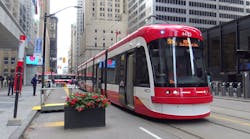Government of Ontario, city of Toronto reach three-year agreement
The government of Ontario and the city of Toronto have reached a new deal that will help achieve long-term financial stability and sustainability for the city. The deal will provide support for a range of municipal infrastructure investments, including transit.
“This new deal means unlocking Toronto’s potential. It means the city has billions more for affordable housing, fixing our aging transit system and building complete communities with child care, community centers, parks and more,” said Mayor of Toronto Olivia Chow. “When all orders of government work together on shared priorities, we can deliver more for the people of Toronto.”
The new deal comes at a time when Ontario transit agencies have been struggling to fund new capital projects while also contending with operating deficits. The previous federal-provincial infrastructure program ended in March 2023 and the new Federal Permanent Public Transit Fund is scheduled to come online in 2026, leaving a significant infrastructure funding gap.
The deal follows joint funding of C$568 million (US$414 million) by the governments of Canada and Ontario and the city of Toronto for new street cars for the Toronto Transit Commission (TTC) and includes up to C$1.2 billion (US$883.2 million) in provincial operating supports for three years. The highlights of the transit related supports include:
- Operating support for new subway-integrated provincial transit projects, the provincially owned Eglinton Crosstown and Finch West light-rail transit systems (LRTs). The two LRT lines will help move thousands of people faster and more conveniently by creating key transit connections integrated with the broader regional transit network, including the TTC subway system.
- A one-time Subway and Transit Safety, Recovery and Sustainable Operations Fund, totaling C$300 million (US$220.7 million) to increase transit ridership, promote subway and transit safety and ensure sustainable operations. The one-time funding will build back ridership through more frequent service, as well as the affordable, convenient, efficient and safe operation of the subway system and is conditional on the city establishing a new Transit Rider Safety Commitment that includes the increased presence of police or safety officers on and near transit, the continued expansion of transit rider cellular and data service across the TTC network and enhanced emergency reporting options and response timelines for riders.
The deal includes up to C$7.6 billion (US$5.6 billion) in capital relief for the city of Toronto, including more than C$750 million (US$551.5 million) funding for 55 new subway trains for the TTC’s Line 2 to ensure the safety and reliability of the subway network. Funding is conditional on federal matching contribution. Procurement of new trains for Line 2 is a top priority for the TTC. To maximize the procurement opportunity, Metrolinx would purchase 15 additional trains for two priority transit projects — the Scarborough Subway Extension and Yonge North Subway Extension.
Commitments of the city of Toronto to the province include:
- Advance housing, transit and infrastructure opportunities to support economic development and growth. The city will streamline and optimize planning approvals and accelerate the delivery of affordable, attainable and rental housing across the continuum.
- Building homes, including a commitment to develop and submit a detailed plan to meet or exceed the city’s annual housing targets and support density near transit, including through the use of tools such as the city’s official plan. Work with the province to identify opportunities for the Ontario Infrastructure Bank to help finance affordable housing and improve alignment of incentives to help ensure availability of housing to residents through tools such as the Vacant Home Tax and the provincial Non-Resident Speculation Tax.
- Advance the delivery of the Priority Transit Projects and support key transportation objectives, including maintaining commitments to existing agreements, finalizing negotiations on the Subway Program Agreement-in-Principle within defined timelines, accelerating and streamlining city-led approvals to advance planning and construction, committing to get traffic moving to reduce gridlock across the city by working with the province and Metrolinx to manage construction schedules, committing to advance Ontario’s One Fare program, implementing regional service integration based on provincial direction and city and TTC support and ensuring Toronto is reimbursed for 100 percent of eligible trips.
- Advancing Transit-Oriented Communities by prioritizing approvals and finalization of agreements for the development of East Harbour and cooperation and collaboration from the city on a proposal for mixed-use Transit-Oriented Communities at the future Woodbine GO Station.
- Community Safety and Economic Recovery, including commitments to support economic recovery for businesses, as well as ridership and farebox recovery, as part of terms and conditions for the Subway and Transit Safety, Recovery and Sustainable Operations Fund to support ridership through affordable, convenient, efficient and safe operations.
The Canadian Urban Transit Association (CUTA) and The Ontario Public Transit Association commended the province and city for their work to reach the deal and recognized the significant transit investments the deal commits to supporting.
“Many Canadian cities face significant pressures when it comes to funding public transit and today’s announcement only reinforces the need for transit funding in communities across Canada,” said CUTA President Marco D’Angelo. “Cities must be equipped to expand transit networks to meet rising demand. The alternative is more road congestion, commuter dissatisfaction and higher emissions. Our members are eager to collaborate with provinces and the federal government to ensure that transportation projects are developed efficiently, sustainably and with an emphasis on accessibility for all residents.”
The province will introduce the New Deal for Toronto Act, which, if passed, would provide the necessary policy to make this deal a reality. The province and the city also called on the federal government to become a full partner in the deal by providing support for key services, such as a federal funding match for the proposed provincial funding for new TTC subway cars.
“This historic new deal will help support the future growth of Toronto, delivering shared priorities like building homes, public transit and infrastructure,” said Ontario Premier Doug Ford. “Toronto is critical to Ontario and Canada’s economic success, and we need all levels of government working together to deliver solutions that protect services and put the city on a path towards long-term financial sustainability. When Toronto succeeds, Ontario and Canada succeed.”

Brandon Lewis | Associate Editor
Brandon Lewis is a recent graduate of Kent State University with a bachelor’s degree in journalism. Lewis is a former freelance editorial assistant at Vehicle Service Pros in Endeavor Business Media’s Vehicle Repair Group. Lewis brings his knowledge of web managing, copyediting and SEO practices to Mass Transit Magazine as an associate editor. He is also a co-host of the Infrastructure Technology Podcast.





